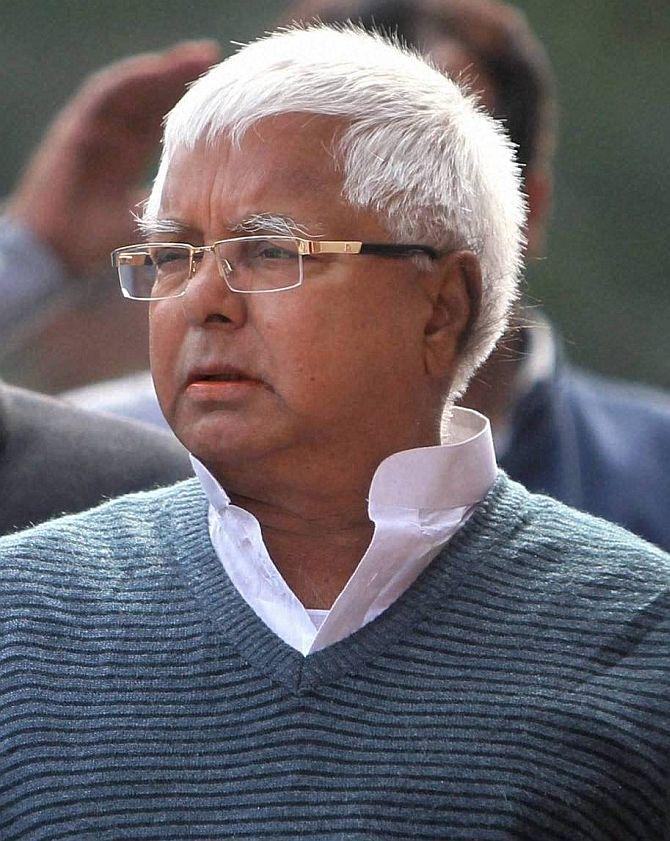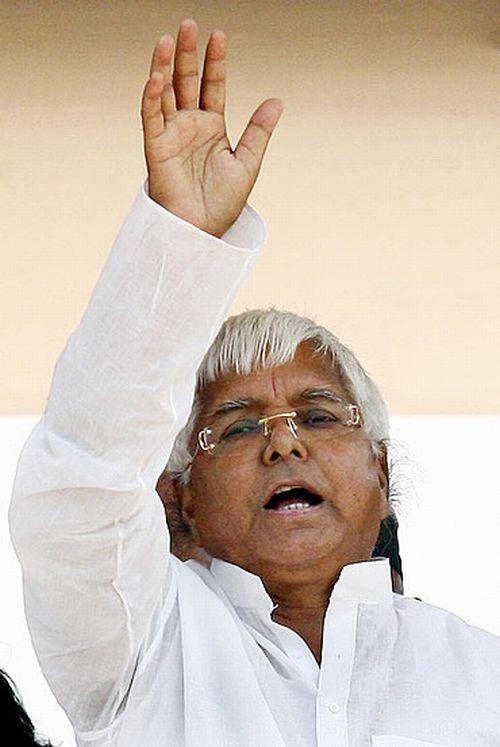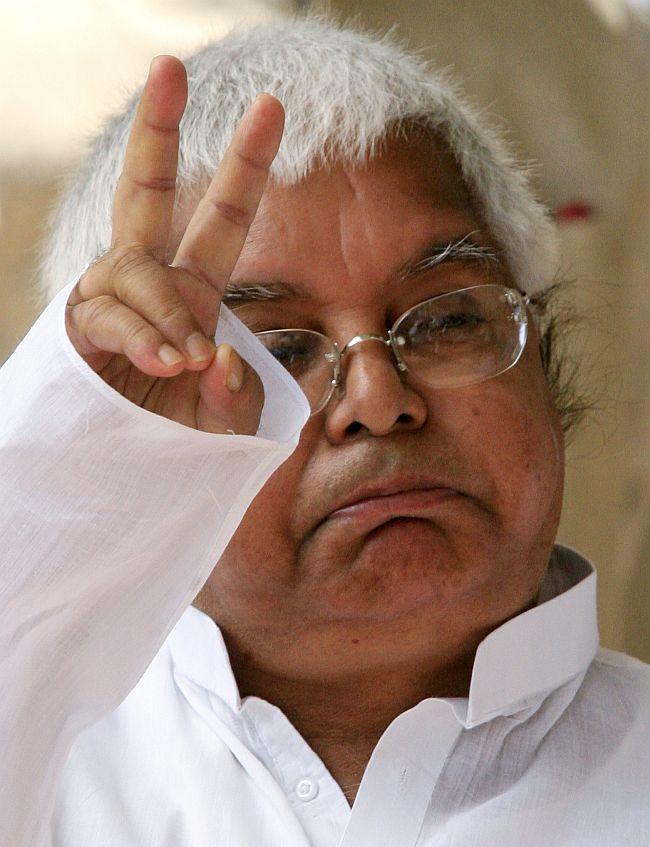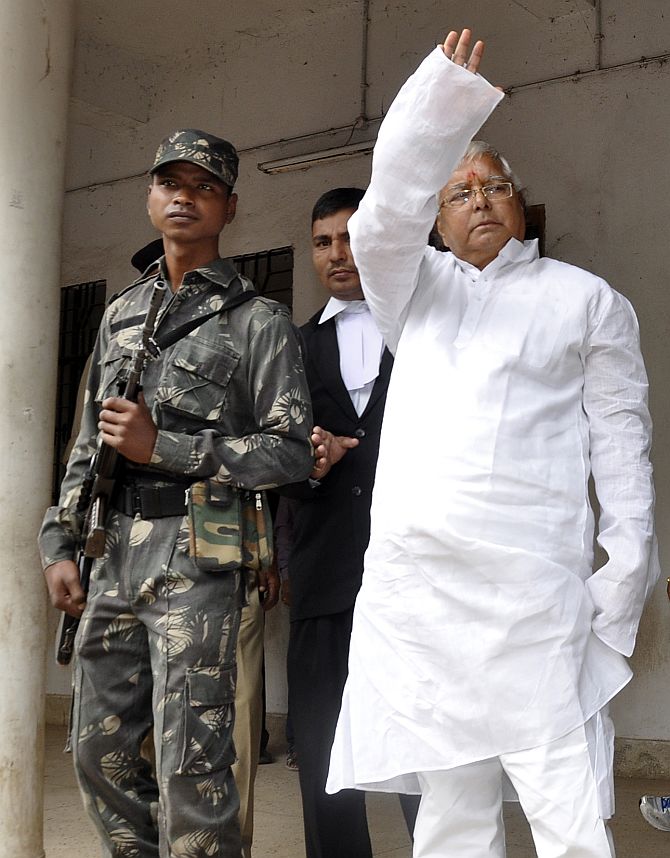 | « Back to article | Print this article |
Fodder scam: Lalu jailed for 5 years, fined Rs 25 lakh
Rashtriya Janata Dal leader Lalu Prasad was on Thursday sentenced to 5 years imprisonment in a 17-year-old fodder scam case by a special court of the Central Bureau of Investigation after he was convicted on corruption and other charges four days back.
The sentencing by special CBI judge Pravas Kumar Singh disqualifies Prasad from Parliament and renders him ineligible for contesting elections for 11 years.
65-year-old Prasad and other convicts are currently lodged in the Birsa Munda Central Jail in Ranchi
The former Bihar chief minister, who was convicted on September 30 dealing a body blow to RJD ahead of next Lok Sabha polls, was also fined Rs 25 lakh.
Another former Bihar chief minister Jagannath Mishra was sentenced to four years imprisonment in the case.
Six other politicians and four IAS officers, among the convicted, were also sentenced to prison terms for fraudulent withdrawal of Rs 37.7 crore from Chaibasa treasury when Prasad was heading the RJD government in the early 1990s.
Click on NEXT to read further...
Fodder scam: Lalu jailed for 5 years, fined Rs 25 lakh
Of the 45 convicts, the judge had delivered the sentence against eight of them on September 30 itself.
Earlier today, arguments on the quantum of sentence Prasad and 36 other convicts were completed in the special court in Ranchi with CBI seeking maximum prison term of up to seven years for them.
The counsel of Yadav, Mishra, sitting JD(U) MP Jagdish Sharma, former legislator R K Rana and others had pleaded for lesser sentence.
Former Development Commissioner Phoolchand Singh, former Science and Technology Secretary Mahesh Prasad, former AHD Secretary Beck Juleus, former Income Tax Commissioner Adhip Chandra Choudhary, former Class I officers Gouri Shankar Prasad, Brajnandan Sharma, K M Prasad (all three were with the Animal Husbandry Department) and other officials, suppliers were among those found guilty.
A sitting from Jahanabad, Sharma also faces disqualification in the wake of a Supreme Court judgement that an MP or MLA would stand disqualified immediately if convicted by a court for crimes with punishment of two years or more and under some other laws even without jail sentence.
RJD spokesperson Manoj Jha has said that the verdict would be challenged in a higher court.
Fodder scam: Lalu jailed for 5 years, fined Rs 25 lakh
The convicts were sentenced under IPC sections 120B (criminal conspiracy), 420 (cheating), 467 (forgery of a valuable security/will or authority to make or transfer any
valuable security/receive any money), 468 (forgery for the purpose of cheating) and 477A (fraudulently destroying or defacing, or attempting to destroy or deface, or secreting a will).
They were also found guilty under the Prevention of Corruption Act, 1988.
Prasad had begun arguments on September 9 and had closed them on September 17 after the Supreme Court turned down his request to transfer the case to another court alleging political conspiracy.
Following the fodder scam, Prasad had to resign as the Chief Minister of Bihar.
After installing his wife Rabri Devi as the chief minister, Yadav had surrendered before a court in Patna on July 31, 1997.
Later, he came to Ranchi following a court order that Ranchi had jurisdiction in the case. The Becon Guest House was converted to a camp jail in Ranchi before he was shifted to the old Birsa Munda Jail at Circular Road here.
Click on NEXT to read further...
Fodder scam: Lalu jailed for 5 years, fined Rs 25 lakh
After Jharkhand's bifurcation on November 15, 2000, litigations were brought before the Supreme Court whether the Patna High Court had the jurisdiction on the cases in this part of the undivided Bihar and trial was stayed for a year till December 2001.
The apex court had said in November, 2001 that trial would be conducted by special courts in Ranchi.
Trial in Ranchi began in March, 2002 by seven special courts. Prasad's counsel had examined 29 witnesses in his defence.
But when the defence continued to skip dates, the court fixed July 15 for delivering the verdict and asked the accused to complete arguments by July 1.
Subsequently, Prasad moved the Supreme Court pleading shifting of his case from the court of Pravas Kumar Singh on the ground of political conspiracy, which the apex court struck down, paving the way for the first judgement against Prasad.



